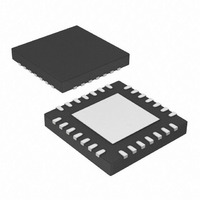PIC16F1827-I/MV Microchip Technology, PIC16F1827-I/MV Datasheet - Page 296

PIC16F1827-I/MV
Manufacturer Part Number
PIC16F1827-I/MV
Description
IC, 8BIT MCU, PIC16F, 32MHZ, QFN-28
Manufacturer
Microchip Technology
Series
PIC® XLP™ 16Fr
Datasheets
1.PIC16F722-ISS.pdf
(8 pages)
2.PIC16F1826-IP.pdf
(406 pages)
3.PIC16F1826-IP.pdf
(12 pages)
4.PIC16F1826-IP.pdf
(8 pages)
5.PIC16F1826-IP.pdf
(40 pages)
6.PIC16LF1827-ISS.pdf
(400 pages)
Specifications of PIC16F1827-I/MV
Controller Family/series
PIC16F
Eeprom Memory Size
256Byte
Ram Memory Size
384Byte
Cpu Speed
32MHz
No. Of Timers
5
Interface
EUSART, I2C, SPI
Core Size
8 Bit
Program Memory Size
4kWords
Core Processor
PIC
Speed
32MHz
Connectivity
I²C, SPI, UART/USART
Peripherals
Brown-out Detect/Reset, POR, PWM, WDT
Number Of I /o
16
Program Memory Type
FLASH
Eeprom Size
256 x 8
Ram Size
384 x 8
Voltage - Supply (vcc/vdd)
1.8 V ~ 5.5 V
Data Converters
A/D 12x10b
Oscillator Type
Internal
Operating Temperature
-40°C ~ 85°C
Package / Case
28-UFQFN Exposed Pad
Processor Series
PIC16F
Core
PIC
Data Bus Width
8 bit
Data Ram Size
384 B
Interface Type
MI2C, SPI, EUSART
Maximum Clock Frequency
32 MHz
Number Of Programmable I/os
16
Number Of Timers
5
Operating Supply Voltage
1.8 V to 5.5 V
Maximum Operating Temperature
+ 85 C
Mounting Style
SMD/SMT
3rd Party Development Tools
52715-96, 52716-328, 52717-734
Development Tools By Supplier
PG164130, DV164035, DV244005, DV164005
Minimum Operating Temperature
- 40 C
On-chip Adc
10 bit, 12 Channel
On-chip Dac
5 bit
Lead Free Status / RoHS Status
Lead free / RoHS Compliant
Lead Free Status / RoHS Status
Lead free / RoHS Compliant
- PIC16F722-ISS PDF datasheet
- PIC16F1826-IP PDF datasheet #2
- PIC16F1826-IP PDF datasheet #3
- PIC16F1826-IP PDF datasheet #4
- PIC16F1826-IP PDF datasheet #5
- PIC16LF1827-ISS PDF datasheet #6
- Current page: 296 of 400
- Download datasheet (7Mb)
PIC16F/LF1826/27
25.2
The factory calibrates the internal oscillator block out-
put (INTOSC). However, the INTOSC frequency may
drift as V
affects the asynchronous baud rate. Two methods may
be used to adjust the baud rate clock, but both require
a reference clock source of some kind.
The first (preferred) method uses the OSCTUNE regis-
ter to adjust the INTOSC output. Adjusting the value in
the OSCTUNE register allows for fine resolution
REGISTER 25-1:
DS41391B-page 296
bit 7
Legend:
R = Readable bit
u = Bit is unchanged
‘1’ = Bit is set
bit 7
bit 6
bit 5
bit 4
bit 3
bit 2
bit 1
bit 0
Note 1:
R/W-/0
CSRC
Clock Accuracy with
Asynchronous Operation
DD
SREN/CREN overrides TXEN in Sync mode.
or temperature changes, and this directly
CSRC: Clock Source Select bit
Asynchronous mode:
Don’t care
Synchronous mode:
1 =
0 =
TX9: 9-bit Transmit Enable bit
1 =
0 =
TXEN: Transmit Enable bit
1 = Transmit enabled
0 = Transmit disabled
SYNC: EUSART Mode Select bit
1 = Synchronous mode
0 = Asynchronous mode
SENDB: Send Break Character bit
Asynchronous mode:
1 = Send Sync Break on next transmission (cleared by hardware upon completion)
0 = Sync Break transmission completed
Synchronous mode:
Don’t care
BRGH: High Baud Rate Select bit
Asynchronous mode:
1 = High speed
0 = Low speed
Synchronous mode:
Unused in this mode
TRMT: Transmit Shift Register Status bit
1 = TSR empty
0 = TSR full
TX9D: Ninth bit of Transmit Data
Can be address/data bit or a parity bit.
R/W-0/0
TX9
Master mode (clock generated internally from BRG)
Slave mode (clock from external source)
Selects 9-bit transmission
Selects 8-bit transmission
TXSTA: TRANSMIT STATUS AND CONTROL REGISTER
W = Writable bit
‘0’ = Bit is cleared
x = Bit is unknown
R/W-0/0
TXEN
(1)
(1)
R/W-0/0
SYNC
Preliminary
U = Unimplemented bit, read as ‘0’
-n/n = Value at POR and BOR/Value at all other Resets
R/W-0/0
SENDB
changes
Section 5.2.2 “Internal Clock Sources” for more
information.
The other method adjusts the value in the Baud Rate
Generator. This can be done automatically with the
Auto-Baud
“Auto-Baud Detect”). There may not be fine enough
resolution when adjusting the Baud Rate Generator to
compensate for a gradual change in the peripheral
clock frequency.
to
Detect
R/W-0/0
BRGH
the
system
feature
© 2009 Microchip Technology Inc.
TRMT
R-1/1
clock
(see
Section 25.3.1
source.
R/W-0/0
TX9D
bit 0
See
Related parts for PIC16F1827-I/MV
Image
Part Number
Description
Manufacturer
Datasheet
Request
R

Part Number:
Description:
IC, 8BIT MCU, PIC16F, 32MHZ, SOIC-18
Manufacturer:
Microchip Technology
Datasheet:

Part Number:
Description:
IC, 8BIT MCU, PIC16F, 32MHZ, SSOP-20
Manufacturer:
Microchip Technology
Datasheet:

Part Number:
Description:
IC, 8BIT MCU, PIC16F, 32MHZ, DIP-18
Manufacturer:
Microchip Technology
Datasheet:

Part Number:
Description:
IC, 8BIT MCU, PIC16F, 32MHZ, QFN-28
Manufacturer:
Microchip Technology
Datasheet:

Part Number:
Description:
IC, 8BIT MCU, PIC16F, 32MHZ, QFN-28
Manufacturer:
Microchip Technology
Datasheet:

Part Number:
Description:
IC, 8BIT MCU, PIC16F, 32MHZ, SSOP-20
Manufacturer:
Microchip Technology
Datasheet:

Part Number:
Description:
IC, 8BIT MCU, PIC16F, 20MHZ, DIP-40
Manufacturer:
Microchip Technology
Datasheet:

Part Number:
Description:
IC, 8BIT MCU, PIC16F, 32MHZ, QFN-28
Manufacturer:
Microchip Technology
Datasheet:

Part Number:
Description:
IC, 8BIT MCU, PIC16F, 20MHZ, MQFP-44
Manufacturer:
Microchip Technology
Datasheet:

Part Number:
Description:
IC, 8BIT MCU, PIC16F, 20MHZ, QFN-20
Manufacturer:
Microchip Technology
Datasheet:

Part Number:
Description:
IC, 8BIT MCU, PIC16F, 32MHZ, QFN-28
Manufacturer:
Microchip Technology
Datasheet:

Part Number:
Description:
MCU 14KB FLASH 768B RAM 64-TQFP
Manufacturer:
Microchip Technology
Datasheet:

Part Number:
Description:
7 KB Flash, 384 Bytes RAM, 32 MHz Int. Osc, 16 I/0, Enhanced Mid Range Core, Low
Manufacturer:
Microchip Technology

Part Number:
Description:
14KB Flash, 512B RAM, 256B EEPROM, LCD, 1.8-5.5V 40 UQFN 5x5x0.5mm TUBE
Manufacturer:
Microchip Technology
Datasheet:

Part Number:
Description:
14KB Flash, 512B RAM, 256B EEPROM, LCD, 1.8-5.5V 40 UQFN 5x5x0.5mm TUBE
Manufacturer:
Microchip Technology










